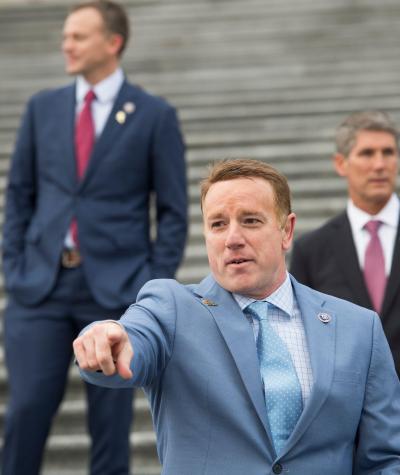The Office of Congressional Ethics (OCE) found substantial reason to believe that Rep. Pat Fallon (R-TX) violated the STOCK Act by failing to disclose up to $17 million worth of stock transactions, following a CLC complaint. Most alarming, the OCE found STOCK Act noncompliance "is pervasive and reflects a culture of delayed filing contrary to the transparency aims of the law.”
The Rep. Fallon matter is similar to the OCE’s first STOCK Act case involving Rep. Tom Malinowski following CLC’s complaint against him. Both reports show that enforcement of the STOCK Act alone does not deter violators and is not enough to protect the public’s trust in government.
For example, Rep. Fallon continued to violate the STOCK Act while under investigation and refused to cooperate with the OCE investigation into whether he intentionally hid transactions, according to the report.
When initially asked about his failure to disclose, Rep. Fallon claimed that he, as a freshman member of Congress, “was unfamiliar with how frequently members of Congress are required to file financial disclosures.”
However, as noted in CLC’s complaint and confirmed by the OCE Report, Rep. Fallon attended mandatory ethics training on the disclosure requirements prior to his millions of dollars’ worth of trades, and he continued to file late reports even after public reporting of his non-compliance.
The trades that Rep. Fallon failed to disclose include defense contractor Boeing, which he traded while he was overseeing the government’s relationship with defense contractors on the House Armed Services Committee, raised serious questions about the conflicts of interest inherent in congressional stock ownership.
Rep. Fallon’s case is yet another example of why transparency alone is not enough to protect the public’s trust in Congress because voters have a right to know that their elected officials are not making decisions based on their personal financial interests.
“Members of Congress frequently misunderstand or ignore their duties under the STOCK Act,” according to the OCE. This fact combined with the proliferation of insider trading allegations demonstrate that the system of disclosure without accountability is not working to protect the public’s trust.
Luckily, there are options out there for reforming the STOCK Act and curbing the rampant conflicts of interest and the perception that lawmakers are not working for the public interest. Various proposals for STOCK Act reform have emerged from public concern with congressional stock trading controversies.
Regardless of what reform ultimately looks like, restricting lawmakers from buying and selling millions of stocks, and then hiding those financial interests from the public, will go a long way to restore the public’s trust in government.

